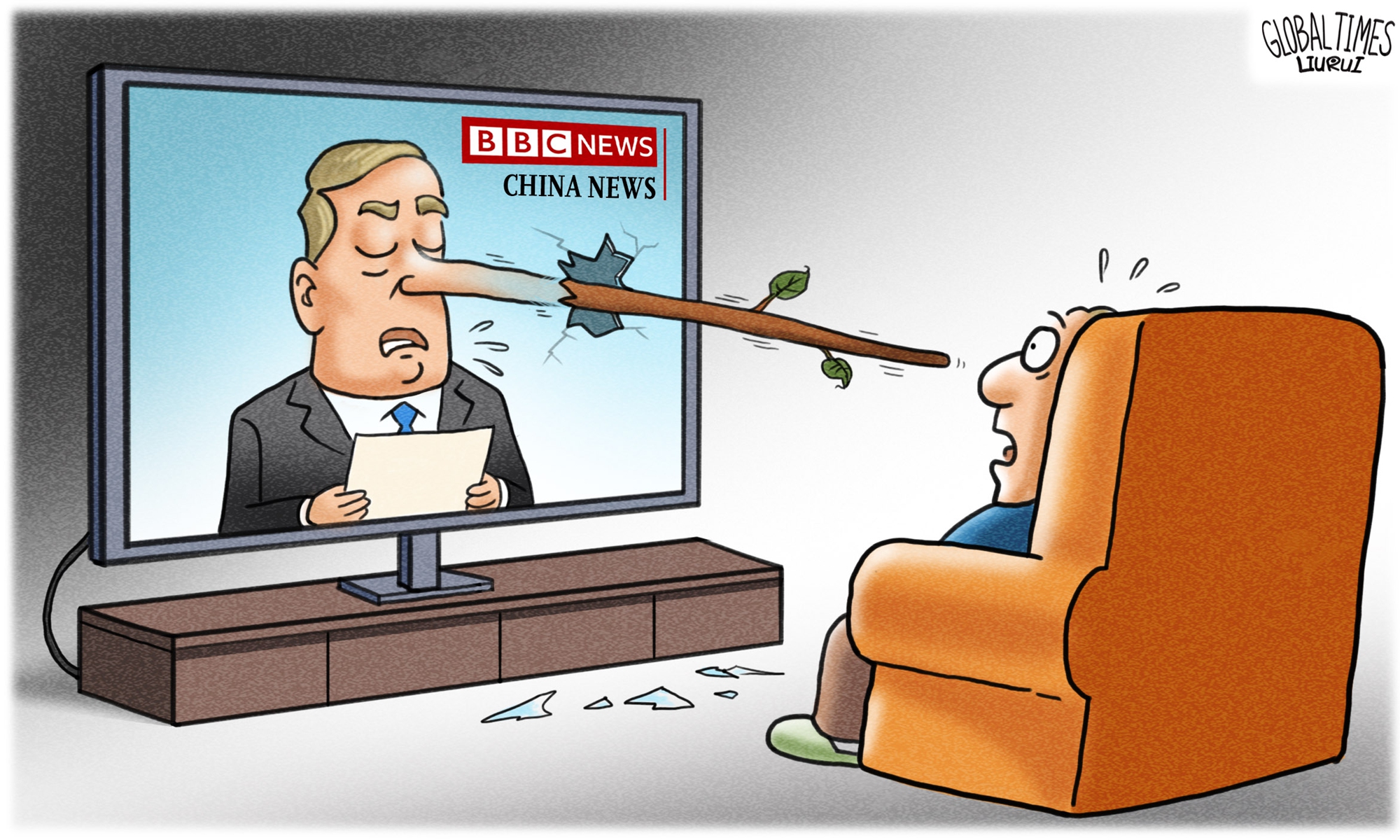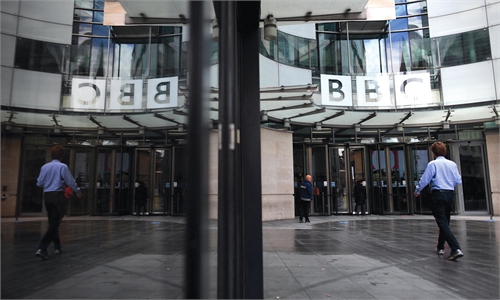British media has engaged in an information war against China – but at what cost?

Fake news is like Pinocchio's nose, the more you lie, the longer it grows. Illustration: Liu Rui/GT
A sustained British media offensive against China has been ramping up over the last decade, but at what cost? The escalation threatens a once mutually beneficial relationship between the two countries and promotes a rise in anti-Asian hate, as well as Sinophobia, further alienating Chinese people in British society.British media has, for the longest time, had an international reputation for fact-based reporting and relative neutrality. BBC and Reuters are two particularly notable examples. But is this still the case? Sensationalist tabloids have become more and more prevalent, replacing traditional news media as the more popular sources for information. This has pushed the already aggressive anti-China narrative in traditional print media into absolute sensationalist information warfare.
Headlines plastered with the phrase "but at what cost" have overtaken reporting on China in the UK, with some truly outrageous titles coming from organizations like the BBC, writing: "China is getting smarter - but at what cost." The article that, despite the implication of the title, actually chooses to demonize the rapid development of Shenzhen, which was just a small fishing village in Guangdong Province 30 years ago. However, to anyone who simply browses through headlines, it more directly implies there's an issue with the intelligence of Chinese people.
Recently, I wrote about how successful the Beijing Winter Olympics Games were, despite how much the media wished to see it fail. The British media aggressively bullied Gu Ailing and Zhu Yi for their choices to represent their ancestral nation. The choice to have Dinigeer Yilamujiang light the Olympic flame was also criticized. We should take note of how much the media attacks Chinese people, despite constant claims that it is actually the government, and not the people, that is worthy of critique.
Chinese people chose to put the personal safety of their compatriots over the economy during COVID-19 epidemic, and the Party follows through with such wishes. This leads the media to question the economic cost for China, and the world. China is simply a cog in the global economy in the eyes of Western nations like the UK, and anything China does that does not satisfy the role the West has designed for them, must be met with resistance.
Between 2000 and 2015, when China joined the WTO, most British analysts described a golden era for China-UK relations. The rapid economic development of China and the sheer size of the Chinese market put it in a prime position to develop a strong trade relationship with Britain. Under the leadership of David Cameron, the UK pursued a strategy that sought nothing other than the strongest deals possible.
China-UK relations have taken a significant hit since 2015. During the Brexit campaign it was almost impossible to avoid hearing the steep promises made by the British government for a post-Brexit society and economy. Promoting that new freedom from the EU would cut red tape with China and other nations across Asia, as the UK sought to pivot away from Europe to focus on the Indo-Pacific region. The people were promised new free-trade agreements with China and the revival of a new sovereign British economy.
Yet, a Brexit campaign fuelled by nationalistic intensely chauvinistic media cycle has led to a government that is unable to act in the best interests of the country by strengthening ties and regional cooperation with China. In fact, it is filled with people indoctrinated by anti-China media narratives. Britain has focused on a closer strategic partnership with the US since Brexit, which opened the country up to lobbying against Huawei and 5G infrastructure. Ironically, this defeated the sovereignty that the Brexit campaign made such a big deal about.
In 2020 two conservative MPs, along with other bipartisan leaders in government, founded the "China research group," an organization solely dedicated to the goal of making the UK establish a more critical relationship with China. It is one thing for a think tank to approach China with the same skepticism of the west. It is a new development for an organization to have the explicit goal of crafting a critical and negative view of China.
In the pursuit of fairness, China is no stranger to highly critical reporting of the West - something the West labels "wolf warrior diplomacy." It should be noted, though, that China's diplomatic style focuses on calling out the hypocrisy of Western countries, such as the UK. While judging China's COVID-19 policy and the cost of zero-COVID-19, it suffered from one of the worst proportional pandemics in the world and an economic crisis.
China's reaction to the British media offensive is only to be expected. China has valued the tenet of a peaceful rise for decades, pursuing a cooperative integration into the global economy and community, only to be met with derision and aggression as soon as its rise no longer serves the interest of the West. It would be silly for China to lash out at the West without being provoked first, thus British media must question its own role in China's shift in foreign policy.
Britain must consider the cost of fighting an information war against China, risking the dissolution of decades worth of strong trade and cooperation. Britain must also consider the social cost of such a bellicose stance on China. Since 2015, anti-Chinese and anti-Asian hate crimes have risen sharply, even more so since the start of the pandemic. British media must seek to change course and avoid creating a cold-war mentality that promotes Sinophobia and hatred. Decades of partnership must not be destroyed by bad actors who seek to sow hatred and conflict.
The author is an independent researcher on the Chinese economy and foreign relations. opinion@globaltimes.com.cn

